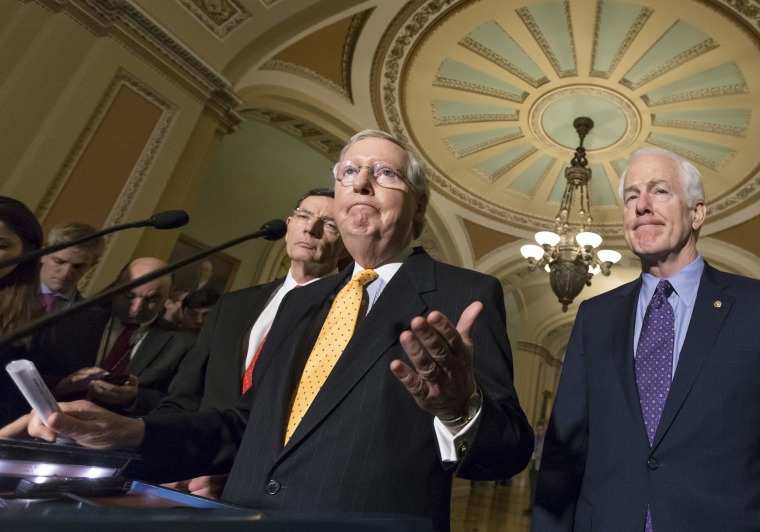"The House bill is not going to come before us. The Senate is starting from scratch. We're going to draft our own bill. And I'm convinced that we're going to take the time to do it right. Speaker Ryan today said that he hoped that the Senate would improve the House bill. I think we will do so and that we will come up with a whole new fresh approach...."
For health-care proponents, this may offer at least some temporary relief. For those concerned that the radical House bill would clear the Senate and be signed by the president, that threat now appears to be effectively off the table. There were reports last week that the upper chamber would ignore the AHCA and write its own legislation, and Collins confirmed that those reports were correct.This also represents a departure of sorts from the plan that existed as recently as six weeks ago. In late March, when it appeared the House might pass an earlier version of its regressive proposal, GOP leaders intended to bring the bill very quickly to the Senate floor -- no hearings, no real scrutiny -- where it would die, and Congress could move on to other issues.Now, however, Republican senators are actually moving forward with plans to try legislating. And while it's far too early to say what they'll come up with -- or whether the House GOP would support this "fresh" alternative -- we do know who'll be doing the work.On Friday, we learned of the Senate Republicans' "working group," tasked with shaping the chamber's alternative to the alternative to the Affordable Care Act. Here's the 13-member list in alphabetical order:Lamar Alexander (R-Tenn.)John Barrasso (R-Wyo.)John Cornyn (R-Texas)Tom Cotton (R-Ark.)Ted Cruz (R-Texas)Mike Enzi (R-Wyo.)Cory Gardner (R-Colo.)Orrin Hatch (R-Utah)Mike Lee (R-Utah)Mitch McConnell (R-Ky.)Robert Portman (R-Ohio)John Thune (R-S.D.)Pat Toomey (R-Pa.)Remember last week, when Trump celebrated with House Republicans in the Rose Garden, and pretty much everyone there was a white, wealthy, middle-aged white guy, smiling about taking health care benefits away from tens of millions of Americans? This list isn't much better.All 13 are men. All 13 are conservative Republicans. Twelve of the 13 represent states that went "red" in 2016. Twelve of the 13 are white. Given the importance of the issue, and the overwhelming number of Americans who may be affected by their proposal, it matters that the Senate GOP didn't bother to make diversity a priority.There's been no explanation as to how these specific senators were chosen, but nearly as interesting as the working group's members are some of the names of those who were left out. Susan Collins, for example, seems like an obvious choice -- her support will be important for any bill -- but she wasn't invited to participate. Neither were other potential critics, such as Sens. Rand Paul (R-Ky.) and Shelley Moore Capito (R-W.Va.).Sen. Bill Cassidy (R-La.), who's already crafted his own reform bill and who's a physician by trade, was also excluded.Regardless, as the Senate prepares to start "from scratch," we can expect a long, arduous process, guaranteeing that the health care fight will dominate the political discussion for the next several months.
